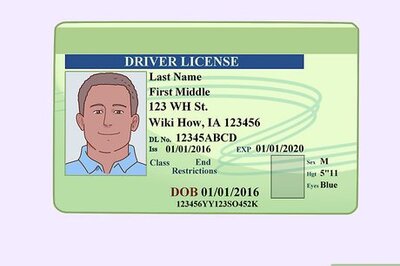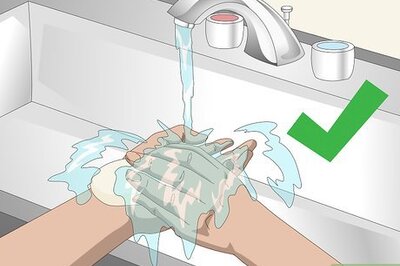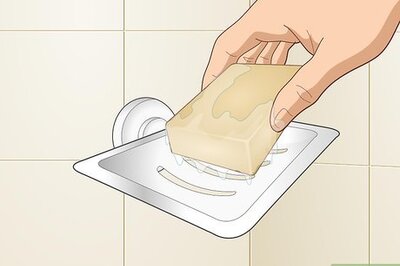
views
Look for signs you’re in a placeholder relationship.
Check if your partner gives you clues that your dynamic is temporary. Whenever you talk to or hang out with your current SO, you might get the creeping feeling that your connection can end at any moment. You might also have a lot of “fun” together but never have any serious talks about the future. In order to get a sense for whether you’re in a short-term situation until someone else shows up in your partner’s life, pay attention to details like: The person you’re dating never defines the relationship you have. They call you up only when they have free time. They never make plans with you in advance. They keep the dynamic on the “down-low” and don’t tell anyone about it. They only hang out at your place and won’t go out in public with you. They’ve recently ended another relationship. They still talk about and idealize their ex. They’re rarely sensitive to your needs and mostly focus on their desires. They don’t express curiosity about you or your dreams. They focus purely on a physical connection.
Define your ideal relationship.
Compare the love life you’d be happy with to what you have now. Picture the connection you dream to have with someone, then describe it to yourself. Create a mantra that tells you you’re deserving of love and that celebrates values—such as supportiveness—that you believe are important. Finally, reflect on whether that vision matches what you see in your current romantic situation. To start to create a better future, make comments like: “I am worthy of affection. I hope to be with someone who nourishes my heart. Right now, I feel that there’s some coldness and distance in my relationship.” “I am very lovable. I’m searching for a situation where I’m praised and appreciated. Currently, I feel a little overlooked.” “I’m an exciting, happy-go-lucky person. I’m seeking adventure and spontaneity. These days, I don’t do very much with the guy I’m seeing.”
Outline your boundaries.
Clarify what respect looks like to determine if you’re receiving it. List the types of treatment that you need in order to thrive in a relationship. Then, be direct about any behaviors that you won’t accept. When you recognize your own “non-negotiables,” or ideas that you feel strongly about, you’ll protect yourself. Before you talk to who you’re dating, prepare to speak up for yourself with words like: “I expect to have plenty of advance notice about dates. I find last-minute plans and cancellations disrespectful.” “I need a mental and emotional connection. I won’t accept a dynamic that’s purely physical. “I believe in strong communication and want a partner who’s curious about my opinions. I can’t stay in a relationship where we never talk.”
Recognize your love language.
You’ll be able to see if you’re experiencing the TLC you need. Check in with yourself about the “love languages”—praise, quality time, gifts, acts of service, and touch—and identify which ones mean the most to you and that you hope you'll receive. Also, consider the ways that you express your own love. It’s important to know what fills you with joy so you can communicate about what may be missing in your connection. It’s possible that your partner may not understand your love language. If that’s the case, it can explain why you haven’t felt fully cared for in the relationship. You might both receive and express love languages in different ways. For example, you may crave cuddles while your partner wants praise. You have a better shot at a strong relationship when these preferences are communicated. Even if this particular connection doesn’t work out, knowing your love language will strengthen other dynamics you enter.
Ask if your dynamic is a rebound relationship.
An honest and transparent talk lets you know where you stand. Reach out to your partner and chat about why they started to date you. Then, check in about their last relationship. If it ended recently—for example, just a couple months ago—then they may not be ready to dive deep with anyone. It’s best for you to know this ASAP to decide if the dynamic is worth investing in. It’s also possible that your partner still hasn’t fully healed from their past relationship, even if it ended a while ago. If the person you’re seeing just wanted some “fun” after a heartbreak, then that’s a sign that they’re on the “rebound.”
Be honest with your partner about patterns you notice.
Review behaviors that make you question the relationship. If there are behaviors that make you doubt how committed the person you’re seeing is, bring those issues up. These actions might be really dramatic, such as ghosting you multiple times. However, they can be more subtle, like talking about themselves a lot and never asking questions about you. Whatever the case is, share your perspective so they’re aware of how they act and the way it impacts you. Bring up any ways that your partner has been inconsistent. For example, say something like, “When we first dated, we hung out twice a week, and now we only see each other once a month.” Be clear about behaviors that you don’t find normal in a healthy relationship. Make a comment like, “You openly flirt with a ton of people online, but you’ve never publicly mentioned me or taken a picture with me.” Talk about how these patterns affect you. Share an outlook like, “When you don’t acknowledge me, I feel like I’m insignificant in your life.”
Point out if you two don’t talk about long-term plans.
Express if the person you’re seeing doesn’t seem serious or invested. Pay attention to how your partner discusses the relationship. Do they only speak about the present and just want to live in the “now”? Maybe they make a lot of noncommittal comments about how they just want to “go with the flow.” If they never even consider what the future might look like with you, then it’s a red flag that they’re treating your dynamic as a short-term one. If they never put dates down on their calendar and “lock in” a day to see you, that’s already a hint that they don’t think about the future. When they can’t clearly define what kind of relationship you’re in and what it can develop into, they probably haven’t thought about how your connection could progress. Test your partner with a question like, “Where do you see us a year from now?” Their answer can tell you how casually they’re treating your relationship. For example, they might tell you they have “no clue.”
Speak up when you feel excluded.
Discuss whether you’ve met your partner’s friends or family or if you’re “hidden.” When you ask to meet their inner circle, do they make up a lot of excuses? Maybe they say that they just can’t find the time to introduce you to everyone or they say that all their loved ones are busy. The individual you’re dating might also just change the topic. Tell them that you notice them dodge the discussion and that they’re not fully integrating you into their life. Start off with a friendly tone and say something like, “So! When am I meeting your friends?” If your partner doesn’t give you a clear answer, ask why they haven’t included you in their social circle yet. Finally, explain why it’s important that you interact with the people they care about. Make a comment like, “I would feel like you’re proud of me if you went out in public with me.”
Be upfront about your romantic goals.
Advocate for a relationship that's sustainable for you. Once you’ve reviewed the patterns that aren’t serving you in the connection, switch gears and open up a dialogue about the situation you do want. Then, you'll both have a chance to determine if your romantic visions are aligned. Make clear comments like these so your partner knows exactly what you expect: “I want to see the person I’m dating at least once a week. I also want quality time, like watching a movie together or going out to dinner.” “I want to feel like I matter and that my partner is invested in me. In order to feel included, I’d like you to finally introduce me to your friends.” “I want to depend on my significant other for emotional support. I need to share when I’m going through a hard time.”
Identify what drew you to the connection.
Explain why you pursued them so they know what you originally expected. Directly tell the individual you’re seeing what made you experience that initial “spark”—they’ll understand what you value in them as well as what you might’ve expected. When you both have this conversation, you’ll be able to evaluate what you thought you’d step into and compare it to what your partner was searching for during your first encounter. Bring up qualities that excited you in the very beginning. For example, you can say, “When I first met you, I noticed you had the most amazing laugh and that you had a fantastic sense of humor.” Then, discuss why you thought the two of you had long-term potential. Share something like, “You seemed really open and warm, so I thought there’d be a lot of care and affection in our relationship.” Ask your partner what they felt ready for. Pose a question like, “At first, you were so enthusiastic and down to hang out. What was going through your head when you met me?”
Reflect on your level of self-esteem.
Ask yourself if your amount of confidence impacts what you accept. Think about your past as well as any recent situations and how either may have had a negative effect on your self-image. Maybe you had a caregiver that was hardly present in your life or you’ve had multiple relationships where you didn’t get your needs met. After you’ve considered why you may feel down on yourself and accept less, reach out to your support network and share that you’d benefit from some extra kindness. A therapist can help you look into your past so you can better understand why you are drawn to certain relationship styles. Your friends and a mental health professional can remind you of your worth and what you deserve so you can pursue people who fully cherish you.
Decide if whoever you’re dating is draining you.
Check in with yourself and consider whether you feel healthy. Are you often stressed and tired? Are there toxic elements of the relationship—like your partner never talking about you to others—that leave you doubting yourself? Maybe you feel a little less passion or joy right now. If your partner is negatively impacting your psychological or physical wellbeing in any way, it’s a sign that they’re not right for you. Exhaustion is one of the first signs that you’re in a “one-sided” relationship and do all the work, resulting in emotional burnout. If your partner isn’t invested in making an effort and you overextend yourself, then your connection is very imbalanced. In some cases, people aren’t aware of the impact they have on others. Tell your partner when you’re emotionally and physically tired. For example, say, “I always drive to you. It’s really wearing me out. I need the person I’m dating to come see me as often as I travel to them.” Reader Poll: We asked 325 wikiHow readers about what led them to end a tricky romantic relationship, and 65% agreed that when it started to make them feel anxious or confused, that was the final straw. [Take Poll] So if that's in line with how you're feeling, you're not alone!
Say you’re willing to walk away.
This makes a strong statement that you know your worth as a partner. When you announce that you won’t stay if you aren’t treated well and are just seen as “convenient,” you’ll wake up the person you’re dating and make them realize that you’re only available for a meaningful and nourishing connection. Whether they change their act or you have to part ways, you’ll finally end a placeholder relationship. Tell them what you’ve learned and why you’re empowered if you leave. Say something like, “I realized that I should remove myself from a situation where I’m not heard or cared for.” Talk about the importance of self-care. Make a comment like, “I know I need to advocate for myself and my health. I only have space for a relationship that uplifts me.”


















Comments
0 comment